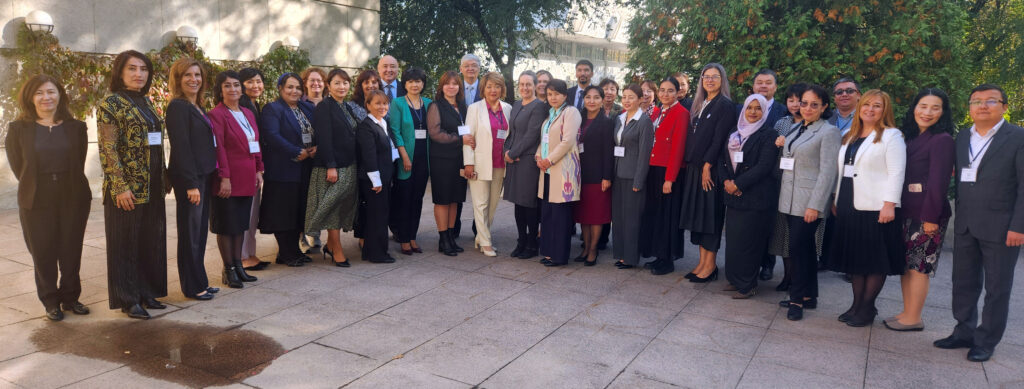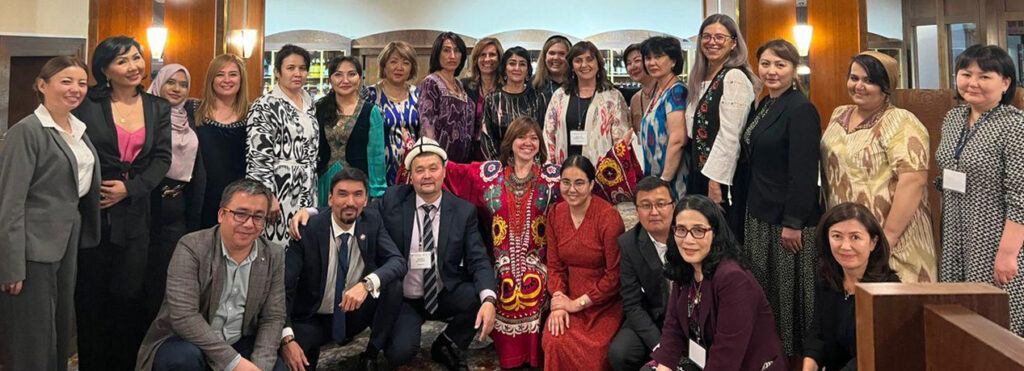November 21, 2023
Margarita Kalinina-Pohl, Masako Toki, Shahneela Tariq
On 16-19 October 2023, the James Martin Center for Non-Proliferation Studies (CNS) and International Science and Technology Center (ISTC) co-hosted an event in Almaty, Kazakhstan, to inaugurate a new regional professional network for women called “Women in Nuclear in Central Asia” (WINCA). More than 40 experts in nuclear and other related fields from Kazakhstan, Kyrgyzstan, Tajikistan, Turkmenistan, and Uzbekistan representing national regulatory bodies, academia, industry, and civil society took part in this event. International participants from the U.S. Department of Energy/National Nuclear Security Administration (DOE/NNSA), U.S. Department of State, World Institute of Nuclear Security (Austria), Women in Nuclear Global (WiN Global), King’s College of London (UK), Malaysian Nuclear Agency, Black Sea Women Network, and the Organization for Security and Cooperation in Europe (Programme Office in Astana) also joined virtually and in person. About a quarter of participants and speakers were former CNS visiting fellows and MIIS alumni who continue working in nonproliferation-related fields in their home countries and internationally. Their professional growth and success are compelling testaments of the sustainable impacts of CNS training efforts. The Almaty inauguration meeting was preceded by a virtual discussion of the network’s establishment by a dozen key regional actors on June 12-13, 2023.
The establishment of WINCA is a new initiative under the ongoing collaboration between CNS, DOE/NNSA Nuclear Security Women Initiative (NSW), and Los Alamos National Laboratory (LANL) to promote women in the nuclear field. The idea of creating such a network in Central Asia was spawned by CNS jointly with WiN Tajikistan and the CBRN Safety and Security Agency of Tajikistan.
Central Asian states have played and continue to play a pivotal role in the nuclear security and nonproliferation regime at the regional and international levels. After the collapse of the Soviet Union, the region inherited nuclear weapons deployed in Kazakhstan, a massive Soviet WMD infrastructure that included operational and abandoned uranium mines and uranium tailings, research reactors in Kazakhstan and Uzbekistan, a uranium fuel production facility in Kazakhstan, and a vast nuclear test site in Semipalatinsk. In 1991, the government of Kazakhstan unilaterally shut down the Semipalatinsk Test Site, and, by 1995, it transferred all nuclear weapons to Russia. All Central Asian states support global nonproliferation and disarmament processes and have joined the main international legal instruments in this area, including the Treaty on the Non-Proliferation of Nuclear Weapons (NPT). Kazakhstan, Kyrgyzstan, Tajikistan, Turkmenistan, and Uzbekistan are additionally parties to the Central Asian Nuclear-Weapon-Free Zone Treaty.
The region’s nuclear workforce is growing due to the development of national nuclear energy programs in Kazakhstan and Uzbekistan, and the expansion of peaceful nuclear infrastructure and radiation applications in all Central Asian states. The region is home to two prominent training centers led by women, including the Regional Training Center on WMD Nonproliferation in Dushanbe and the Nuclear Security Training Center in Almaty. There are several NGOs in Kazakhstan and Kyrgyzstan working on issues related to nuclear safety and security, nonproliferation, and export controls that have been founded by women. There are countless women professionals who have participated in their countries’ earlier efforts to dismantle Soviet nuclear infrastructure and secure vulnerable materials, and who continue working on strengthening nuclear security. There is also a new generation of young female professionals joining their ranks. Therefore, the establishment of an interdisciplinary and intergenerational network for women professionals in nuclear fields is deemed to be a great way to unite, support, and empower women professionals from Central Asia by amplifying their voices and participation in leadership positions.
The WINCA inaugural meeting in Almaty focused on the formation of this network, its concept, and structure. The meeting was opened by the U.S Consul General in Almaty, Ms. Michelle Yerkin, who was introduced by Ms. Constance McAninch, Director of the Department of Energy Office at the U.S. Embassy in Astana. In her remarks, Ms. Yerkin emphasized the importance of the network’s mission to unite women in the nuclear field, to help them find their common voice to identify challenges and opportunities for women in the nuclear sector, and to encourage collaboration in overcoming these challenges. Ms. Erin MacLaughlin from NNSA’s Office of International Nuclear Security, Ms. Aiymgul Frith from ISTC, Ms. Zarina Sayfieva from WiN Tajikistan,and Ms. Olga Martin from LANL provided welcome remarks. Ms. Sayfieva also greeted meeting participants on behalf of Dr. Ilhom Mirsaidzoda, the Director of CBRN SSA, who has been an avid supporter of this network since its inception.
Dr. Togzhan Kassenova, a Senior Fellow at the Center for Policy Research, University at Albany, a former CNS postdoctoral fellow, and an award-winning author of “Atomic Steppe: How Kazakhstan Gave Up the Bomb,” gave the keynote address. Kassenova talked about how everyone, in their own sphere of responsibilities, can make a difference for improving diversity and increasing women’s voices. “When you organize an event, a panel, act as an editor of a collection of articles, who do you invite? When you are developing a curriculum, whose work do you include in the overview of existing literature? Do you, without even noticing, quote only male scholars? Be as generous as possible when sharing your experience, knowledge, and insights with others. The nuclear field is very collegial, and people tend to help each other a lot. Think not about what the field can give you, but what you, as an individual, can do to make it better,” Kassenova said.
The meeting program featured sessions highlighting initiatives to support women in Central Asia, international initiatives to support diversity, equity, and inclusion in nuclear and other related fields, international cooperation and assistance programs in Central Asia, new trends in nuclear energy and security, and other topics. One of the most vibrant discussions erupted during the round-table session on the topic “Women in Nuclear Fields: Career Paths, Challenges, and Opportunities” when several participants told their stories and shared their experiences. The program also included presentations by WINCA members about their organizations’ activities in nuclear and other related areas. Madalina Stefanic from the Black Sea Women in Nuclear network and Sabariah Kader Ibrahim from Women in Nuclear in Southeast Asia shared best practices about their networks.
A substantial segment of the program was devoted to discussions of WINCA’s concept, mission, structure, leadership, and future activities. The importance of mentorship programs and engagement of young professionals was given particular emphasis. WINCA is emerging as an informal professional network that will help build partnerships and will provide networking, mentoring and educational and training opportunities. It will serve as a platform for discussing gender balance and women’s inclusion in nuclear and other technical fields in Central Asia, increasing women’s participation in leadership positions, and strengthening women’s voices in regional and global nuclear dialogue. After having unanimously adopted WINCA’s concept on October 18, the participants designated this date as the network’s birthdate. Zarina Sayfieva, WiN Tajikistan President and Director of the Regional Training Center on WMD Nonproliferation (CBRN SSA), will serve as the first WINCA Coordinator. A video with reflections by the participants about what WINCA means to them was made to commemorate the network’s first birthday.
The program concluded with a visit to the Institute of Nuclear Physics in Almaty. The technical visit included a tour of a VVR-K research reactor, and other facilities using nuclear technologies for research and commercial purposes. The visit ended with a presentation about the Nuclear Security Training Center (NSTC). NSTC was created on the initiative of the Government of the Republic of Kazakhstan with the support of DOE/NNSA. NSTC is part of the International Atomic Energy Agency network of centers for training and assistance in the field of nuclear security.
This meeting was the first such gathering for women from five Central Asian states working in nuclear and other related fields and it proved to be a very timely and useful initiative as reflected in participants’ testimonials below (original style and grammar are preserved).
“I am convinced that this network is fully committed to the advancement of qualified women in the nuclear and radiation professions. I also witness to the fact that women working in the nuclear field have an important role to play in ensuring the safety and peaceful use of nuclear energy and its applications. …this activity and network are fully aligned with the agenda and policies in Uzbekistan, and our organization will actively advocate for the promotion of qualified women in nuclear and radiation professions. Encouraging the growth and advancement of qualified women in nuclear science and technology careers, as well as cultivating and mentoring future nuclear workers will be a priority for our organization too.”
“I am convinced that the professionalism, competence and teamwork of all stakeholders will serve an excellent foundation for the successful development of WINCA Network!”
“Inter-regional and also international cooperation of women in the Nuclear (CBRN) is a sustainable way to increase the potential of women in each country in this field by respecting culture and national traditions.”
“Regarding the meeting, it was an exceptional opportunity for me to connect with experts from the region and gain insights from their experiences. In particular, the session where accomplished women shared their personal journeys was immensely valuable to me. It addressed many of my questions and provided a sense of relief to discover that they had encountered similar challenges at the outset.
In conclusion, here is a summary of the meeting offered by Dr. Irina Tazhibayeva, Executive Director of the Nuclear Technology Safety Center (Kazakhstan):
“Nuclear (CBRN) science needs women and women need WINCA network!”



